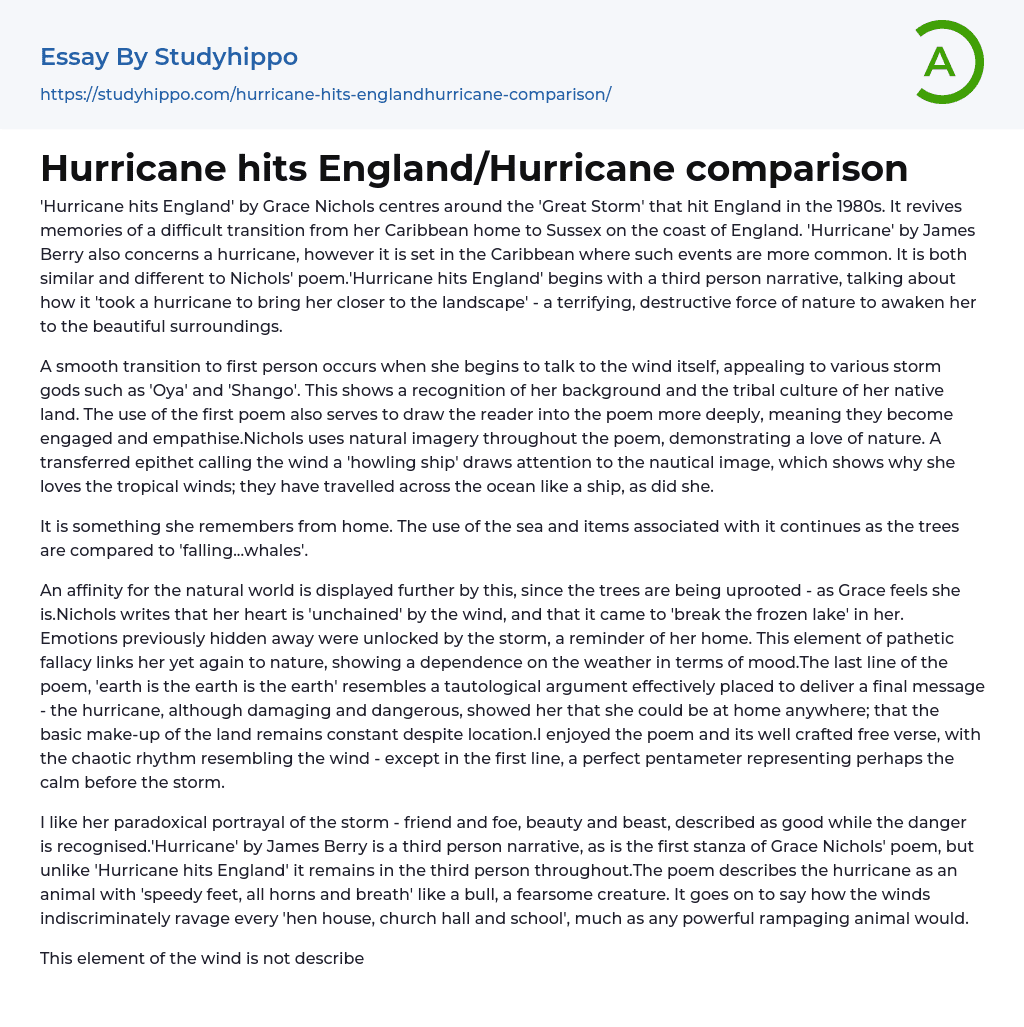'Hurricane hits England' by Grace Nichols centres around the 'Great Storm' that hit England in the 1980s. It revives memories of a difficult transition from her Caribbean home to Sussex on the coast of England. 'Hurricane' by James Berry also concerns a hurricane, however it is set in the Caribbean where such events are more common. It is both similar and different to Nichols' poem.'Hurricane hits England' begins with a third person narrative, talking about how it 'took a hurricane to bring her closer to the landscape' - a terrifying, destructive force of nature to awaken her to the beautiful surroundings.
A smooth transition to first person occurs when she begins to talk to the wind itself, appealing to various storm gods such as 'Oya' and 'Shango'. This shows a recognition of her background and th
...e tribal culture of her native land. The use of the first poem also serves to draw the reader into the poem more deeply, meaning they become engaged and empathise.Nichols uses natural imagery throughout the poem, demonstrating a love of nature. A transferred epithet calling the wind a 'howling ship' draws attention to the nautical image, which shows why she loves the tropical winds; they have travelled across the ocean like a ship, as did she.
It is something she remembers from home. The use of the sea and items associated with it continues as the trees are compared to 'falling...whales'.
An affinity for the natural world is displayed further by this, since the trees are being uprooted - as Grace feels she is.Nichols writes that her heart is 'unchained' by the wind, and that it came to 'break th
frozen lake' in her. Emotions previously hidden away were unlocked by the storm, a reminder of her home. This element of pathetic fallacy links her yet again to nature, showing a dependence on the weather in terms of mood.The last line of the poem, 'earth is the earth is the earth' resembles a tautological argument effectively placed to deliver a final message - the hurricane, although damaging and dangerous, showed her that she could be at home anywhere; that the basic make-up of the land remains constant despite location.I enjoyed the poem and its well crafted free verse, with the chaotic rhythm resembling the wind - except in the first line, a perfect pentameter representing perhaps the calm before the storm.
I like her paradoxical portrayal of the storm - friend and foe, beauty and beast, described as good while the danger is recognised.'Hurricane' by James Berry is a third person narrative, as is the first stanza of Grace Nichols' poem, but unlike 'Hurricane hits England' it remains in the third person throughout.The poem describes the hurricane as an animal with 'speedy feet, all horns and breath' like a bull, a fearsome creature. It goes on to say how the winds indiscriminately ravage every 'hen house, church hall and school', much as any powerful rampaging animal would.
This element of the wind is not described by Nichols, to whom it is a 'dark, ancestral spectre' - frightening and respected, yet a comforting reminder of her past.In contrast to 'Hurricane hits England', Berry shows not only destruction of trees and the natural environment but also buildings and manmade objects (that Nichols seems unconcerned about and indifferent
to) - it 'shakes walls...bought roofs down' and annihilates livelihoods and homes.The two poems both describe trees breaking.
In th Caribbean, the wind 'wrung soft banana trees' and 'pounded vines of yam'. The destruction of forest is also present in England. The word 'pounded' endows the tropical storm with the very human ability to use hands to tear and beat things, personifying it. They both relate to the Caribbean.
Imagery such as 'zinc sheets are kites' in 'Hurricane' allows the reader to visualise the state of a place after the storm. The fact that the metal sheets are 'kites', thin sheets of paper, shows the strength and power of the wind, to make zinc seem flimsy. It also makes the wind seem almost playful - it is mostly children who fly kites.Berry shows that in a storm, all are equal - 'goats, dogs, pigs, all are human together'.
This means all suffer equally when nature wreaks havoc, because it does not differentiate. This is different to the feel in 'Hurricane hits England', which focuses mostly on the effect on the author.
- Air Pollution essays
- Carbon Dioxide essays
- Climate essays
- Deforestation essays
- Ecology essays
- Endangered Species essays
- Environmental Issues essays
- Environmental Protection essays
- flood essays
- Greenhouse Gas essays
- Hurricane essays
- Nature essays
- Pollution essays
- Renewable Energy essays
- Sustainability essays
- Tornado essays
- Traffic essays
- Tsunami essays
- Water Pollution essays
- Allegory essays
- Alliteration essays
- Comedy essays
- Comic book essays
- Drama essays
- Dystopia essays
- Fairy Tale essays
- Fantasy essays
- Fiction essays
- Ghost essays
- Gothic Fiction essays
- Gothic Literature essays
- Irony essays
- Legend essays
- Memoir essays
- Novel essays
- Poetry essays
- Satire essays
- Science Fiction essays
- Short Story essays
- The western essays
- Tragedy essays
- Witchcraft essays
- Atmosphere essays
- Biodiversity essays
- Coral Reef essays
- Desert essays
- Earth essays
- Ecosystem essays
- Forest essays
- Lake essays




